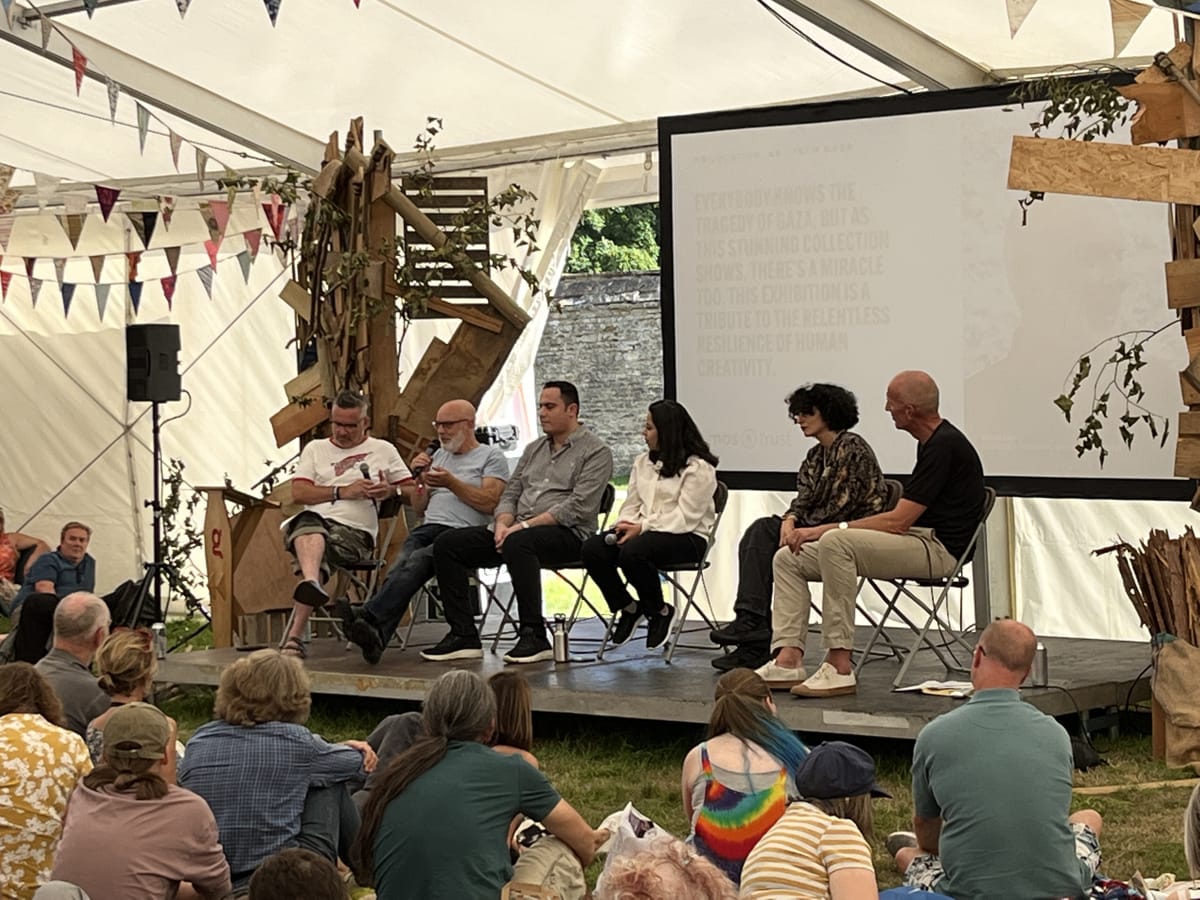
In August 2022 I attended the Greenbelt Festival of Art, Ideas and Spirituality in Northamptonshire, England. I was delighted to find that Brian Eno was one of the many speakers.
As part of a discussion panel Mr Eno asked the question 'What is the opposite of art?' and if I remember rightly he suggested that war may be that opposite. Since the panel included Palestinian artists this question and answer reverberated in the discussion.
So what is the opposite of art? It is an interesting question. What do philosophers and aestheticians think? I did some research.
Possible opposites of art
Science and Technology
Some suggest that science and technology is the opposite of art but many others think this incorrect and even insulting to scientists and technologists since their work often includes creative thinking. So maybe we need to say that art itself is creative, and makes new things, but that any other field where new things are made is also creative including the making of new ideas about science, technology and even politics. So it seems reasonable to say that science and technology are not the opposite of art, but do in fact share some characteristics with it.
Bureaucracy
Others see bureaucracy as an opposite of art but again that seems insulting to those who administer complex modern societies, or indeed those who administered historically successful bureaucracies such as the one in ancient China. Bureaucrats are theoretically capable of creativity in their conduct of administration and in the reviews and development of the rules of that administration.
Practicality
I read that practicality was the opposite of art but immediately hit a problem with this idea. The arts – sculpture, painting, music to name a few, do require a certain practicality. Where the notes are on the neck of a violin for example, or the practical technique of painting. When one looks at the decorative or one might say ‘practical’ arts such as furniture or architecture then the idea that practicality is the opposite of art becomes even shakier, since here decorative art and practicality meet.
Vandalism
This seems to be a good antithesis of art as vandalism is defined as simply destruction.
Some people consider graffiti to be vandalism whereas others consider it to be art. Perhaps it depends on what the graffiti adds to the surface on which it is painted. If it enhances its surroundings then maybe it can be art, such as Banksy’s works. But if it defaces and degrades then surely it is vandalism. Also what are the sentiments contained in the graffiti – are they offensive and designed to oppress or marginalise a group of people? Again if so then that is surely vandalism.
War
Brian Eno suggested that war is the opposite of art. Quite possibly this is true since war is designed to destroy. What war creates may be for example regime change as in the Second World War, but no war was ever fought to create art.
But what if war is fought to remove evil? To liberate people from tyranny? That may bring about something positive but it is not art.
So war seems a good antitheses to art.
Oppression
I would argue that oppression can include war, vandalism, immoral science (not all science is immoral) and rigid bureaucracy since all of these oppress people in some way. Oppression arguably negates people’s true creativity since it often prevents them from expressing it.
In Stalin’s Russia art was permitted but only if it glorified the communist state, so bureaucracies can permit art but repress the true nature of art, so it expressed the ideas of those who operate the bureaucracy, and not the artist or the intended audience.
Despite oppression art can be and is created, but that does not mean that oppression is compatible with art. Art is created in spite of it.
So oppression can be seen as an antitheses to creativity, and therefore by extension art.
However oppression does not necessarily destroy anything except freedom and self expression, so it is cannot be the opposite of the act of creation. Perhaps oppression allows the more direct opposites of art such as vandalism and war?
Censorship
I will class censorship as the practical application of oppression, and as a form of oppression. Censorship can lead to the destruction of art, so facilitates vandalism in that sense.
Is this whole argument a trick of words?
Sceptics have suggested that since art itself has not been satisfactorily defined, then neither will its opposite, and that because our notions of art change constantly so will definitions of its opposite. That is a sound argument, except that the fact that art and ideas about art change, does not mean that at a specific point in time, there is no definition of art. Surely if art changes then the definition of it will change. Any definition can only be made with the information known at the time.
Art as a human activity
A writer on the Internet has said that there is no opposite of art as long as there are human beings. This maybe comes from Tolstoy’s definition of art as the expression of the human spirit.
If all art is an expression of our human spirit, then what are we to make of people whose nature is to make war or vandalism? Is that an expression of their spirit? We have to then define what me mean by the ‘spirit’.
I would say history shows us that there were, alongside artists who expressed the human spirit, such as Picasso and Dali, destructive men such as those who started the Second World War, even as the aforementioned artists painted and created.
Conclusion
For now I will accept that vandalism and war are the best culprits as opposites of art, and that the more general label of oppression, to include these opposites, might be the opposite of creativity.
Like the philosophy of aesthetics itself, this article is a work in progress.








